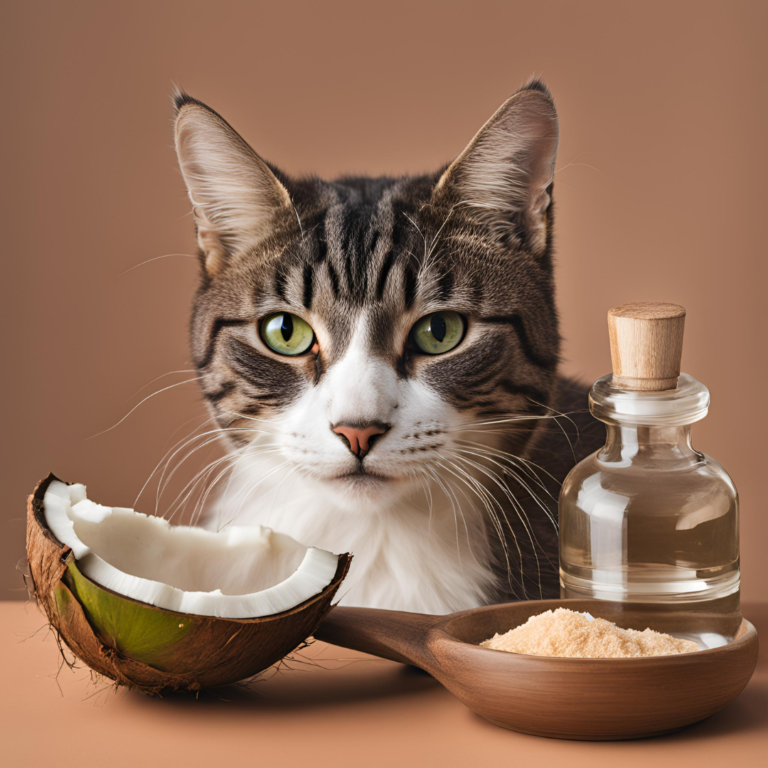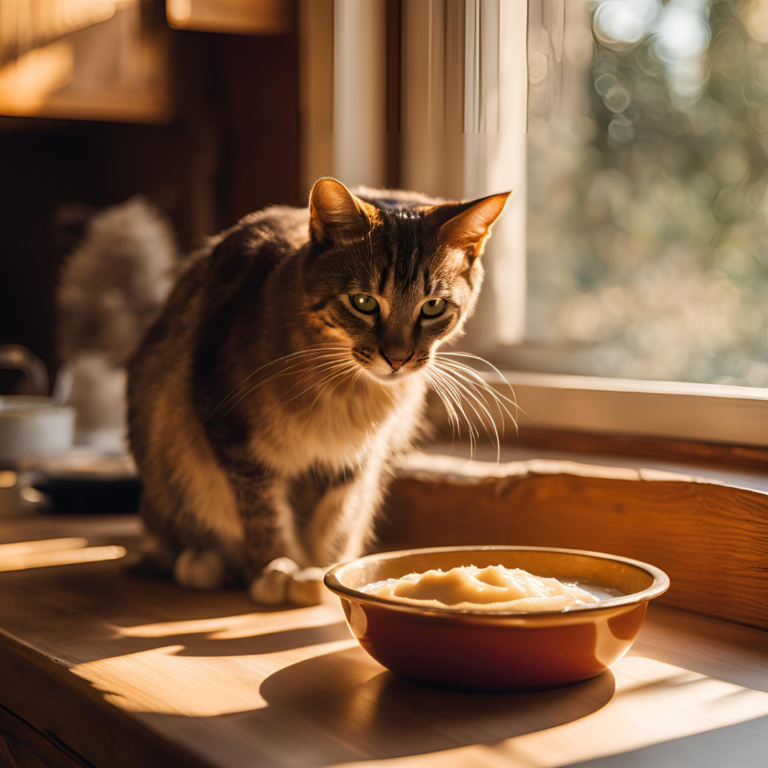Table of Contents
Most of us are familiar with coconut oil, and many use it regularly, whether for food, hair care, or skincare. Coconut oil is often considered beneficial for human health.
But is coconut oil safe for cats? Does it offer any benefits to them? If you’re considering giving coconut oil to your cat but are unsure due to a lack of proper information, this article will help provide the answers you’re looking for. Let’s take a closer look.
Is Coconut Oil Safe for Cats?
The short answer is yes, coconut oil is generally safe for cats when used in moderation. Cats may experience some benefits, such as mild support for digestion and skin health. However, coconut oil should be introduced slowly and only in small amounts.
It’s important to remember that cats are obligate carnivores, meaning their primary nutritional needs come from animal proteins and fats. While coconut oil can be beneficial in small doses, too much can pose health risks.
Note: Always consult a vet before introducing coconut oil or any new foods into your cat’s diet.
Nutritional Benefits of Coconut Oil for Cats
While coconut oil is beneficial for humans, it can provide certain benefits to cats, but only when used sparingly. Here are some possible benefits:
Skin and Coat Health
Coconut oil may help improve skin hydration and reduce dryness or flakiness, contributing to a shinier coat. It may help with some minor skin irritations, but it’s not a guaranteed solution for all cats.
Digestive Aid
Coconut oil has mild laxative properties, which can help relieve constipation in some cats. However, it’s not a longterm solution for digestive issues.
Energy Source
Coconut oil contains MediumChain Triglycerides (MCTs), which can provide a quick energy source. However, this benefit is minimal compared to what cats require from animal fats and proteins.
Note: While these benefits may apply to some cats, they do not replace a proper, balanced diet. Coconut oil should be used only occasionally and in moderation.

Choosing Coconut Oil for Cats
If you want to use coconut oil for your cat, consider the following:
Choose Organic, Unrefined, and ColdPressed Oil: This ensures that the oil retains its natural nutrients.
Avoid Additives and Preservatives: These can be harmful to your cat. Always choose pure coconut oil.
Glass Jars over Cans: Glass containers protect the oil from light and contaminants better than cans.
HighQuality Brands: Choose a reputable brand to ensure there are no impurities or harmful substances in the oil.
Note: If you’re unsure which coconut oil is best, consult a vet for recommendations.
Suitable Quantities of Coconut Oil for Cats
Although coconut oil is safe for cats, it should be given in small amounts. The appropriate amount depends on your cat’s size and weight.
- Start by offering ¼ teaspoon per day for an averagesized cat (about 10 pounds).
- If your cat tolerates it well, you can increase the amount to ½ teaspoon per day.
Always monitor your cat for any adverse reactions, such as vomiting or diarrhea. If any issues arise, discontinue use immediately.
Note: It’s best to consult a vet before offering coconut oil to ensure the correct dosage for your cat.
Potential Risks of Coconut Oil for Cats
While coconut oil can offer some benefits, it also has potential risks if used in excess:
Digestive Issues: Large amounts of coconut oil can lead to vomiting, diarrhea, or other gastrointestinal issues.
Weight Gain: Coconut oil is caloriedense and can contribute to weight gain if given too frequently.
Pancreatitis Risk: In some cases, excessive fat intake, including coconut oil, may increase the risk of pancreatitis in cats, a serious condition requiring medical treatment.
Allergic Reactions: Although rare, some cats may have an allergic reaction to coconut oil, causing skin irritations or other allergic symptoms.
Note: Always be mindful of these risks and consult a vet before making coconut oil a regular part of your cat’s diet.

Creative Treats with Coconut Oil for Cats
If you’d like to use coconut oil as a treat, here are two simple ideas:
- Pumpkin or Sweet Potato Mix: Combine cooked, nonseasoned pumpkin or sweet potato with a small amount of coconut oil. Serve in moderation as a treat (no more than 1 teaspoon).
- Food Topper: Warm a small amount of coconut oil and mix it into your cat’s regular food to enhance flavor (use sparingly).
Note: Some cats may not tolerate coconut oil treats well, so consult a vet before introducing them.
Dos and Don’ts
Dos:
- Introduce coconut oil to your cat slowly and in small amounts.
- Use only organic, unrefined, additivefree coconut oil.
- Monitor your cat closely after feeding coconut oil for any adverse reactions, such as vomiting or diarrhea.
- Consult a vet before adding coconut oil to your cat’s diet.
Don’ts:
- Don’t give your cat large amounts of coconut oil, as it can cause digestive issues.
- Don’t rush the process of adding coconut oil to their diet. Take time to adjust, and ensure you have all the necessary information.
- If your cat has health issues like pancreatitis or digestive problems, avoid giving them coconut oil.
- Avoid low quality coconut oil, as it may contain harmful additives or impurities.
Conclusion
Coconut oil is generally safe for cats and may provide certain benefits, but it should always be given in moderation. Offering larger amounts can lead to digestive problems and other health issues. Always consult your vet before adding coconut oil or any new food to your cat’s diet, as they can recommend the best quality and suitable quantity based on your cat’s individual needs.
Note: Before making any changes to your cat’s diet—whether adding something new or removing something—always consult a vet to ensure your cat’s safety and wellbeing.
FAQ’s
Is coconut oil safe for cats?
Yes, coconut oil is safe for cats when given in moderation. However, always consult a vet first.
What are the benefits of coconut oil for cats?
Coconut oil can help with minor skin irritations, dry skin, and mild digestive support, but should be used sparingly.
How should I introduce coconut oil to my cat’s diet?
Start with small amounts, such as ¼ teaspoon, mixed with your cat’s regular food. Monitor for any adverse reactions.
Can coconut oil help with hairballs?
Yes, coconut oil may help lubricate the digestive tract, potentially reducing hairball formation.
Are there any risks associated with coconut oil?
Yes, large amounts of coconut oil can cause digestive issues like vomiting or diarrhea and may lead to weight gain. Consult a vet before use.
Can I apply coconut oil topically on my cat?
Yes, you can apply coconut oil to dry skin or minor irritations, but avoid sensitive areas, and prevent your cat from licking off too much.
Is there a specific type of coconut oil I should use?
Look for organic, virgin coconut oil without additives or preservatives.
How often can I give my cat coconut oil?
Coconut oil can be given 12 times a week in small amounts, but it depends on your cat’s health. Always consult a vet for personalized advice.



